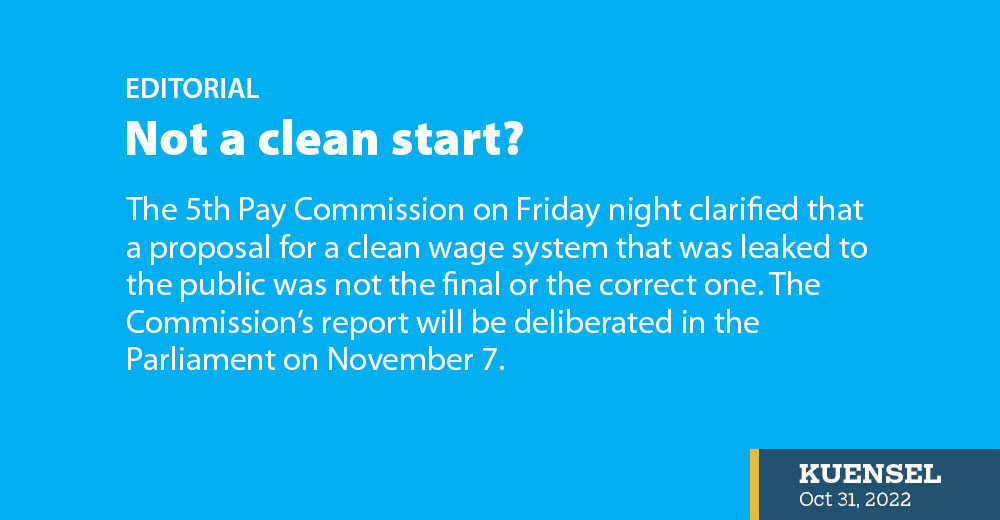The 5th Pay Commission on Friday night clarified that a proposal for a clean wage system that was leaked to the public was not the final or the correct one. The Commission’s report will be deliberated in the Parliament on November 7.
The proposal which is circulating is dated April 2022, way before the Pay Commission was formed. The “leaked” proposal with detailed information on the current system including unethical practices, analysis on annual expenditure on allowances for public servants and the benefits of a clean wage system is convincing for those who are not aware of the final proposal, yet to be made public.
Those who got a peek into the leaked proposal are not impressed. The average revision is about Nu 5,800. In a normal salary revision, Nu 5,800 is a huge revision. But given the expectation of a “clean wage system”, not many were happy. This is also because after the reform exercises, there were talks that even a civil servant in the support and service category would earn around Nu 30,000 and those in the professional category would cross the five-digit mark.
What civil servants would earn in salary and allowances and how clean the wage system would be known after the elected representatives of the people deliberate it in the Parliament. What is becoming clear is it is not only our pipes that are leaking. The “Proposal for Clean Wage System” is not the first document to be leaked.
It is a big problem, on one hand when documents, proposals or policies that are not finalised are leaked. There is an advantage in doing so, on the other hand.
The Pay Commission is after the person who leaked the document. It is a waste of time and energy, especially if it is not final.
Leaking information to the media is not a new trend. In fact, with the media seen as intruders, a large majority of stories in the media come from leaks, tip-offs, and unknown sources. As long as the information is correct, the media will stand by it (BBS is challenging the claims of the Pay Commission). Most of these stories are generally those that government organisations or agencies would not want to see in the press before the “due process is met.”
Information is leaked for numerous reasons. Smart politicians or governments regularly leak information or policy decisions to gauge public reaction or feel the mood. If the response is good they go ahead, if not they deny all knowledge of it and blame the media. Every leak, it is believed, has a different motive and implication, from harmless pranks to say, salary raise.
As long as the decision is not final, it is good to see public reaction on policy decisions. For instance, those who saw the proposal are not impressed and say that a pay revision is already around the corner when a new government is elected in 2024.
The Pay Commission or those beyond the clean wage system could learn from the feedback to improve the proposal instead of chasing officials who leaked the proposal. It would save time and improve the proposal. Besides, what is there to hide from the people who would benefit from a new wage system?


